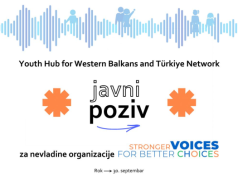 With funding from the Rockefeller Brothers Fund, the Muabet project at the Watson Institute for International Studies is organizing an open essay competition to highlight the value of locally-grounded perspectives on international democracy-building efforts in the former Yugoslavia.
With funding from the Rockefeller Brothers Fund, the Muabet project at the Watson Institute for International Studies is organizing an open essay competition to highlight the value of locally-grounded perspectives on international democracy-building efforts in the former Yugoslavia.
We invite students, scholars, professionals, activists and practitioners in the region to submit essays which analyze the social, cultural, political or economic dimensions of international involvement in transition. We are particularly interested in essays which communicate the experience of working with or within international organizations, either in the non-governmental or the governmental sector, and which build on that empirical base to offer analytical perspectives on progress made over recent years. The best essays will be published in English.
The deadline for submissions is May 18 2007.
Essays can be submitted in English, Macedonian, Albanian, Serbian, Croatian or Bosnian, at http://watsoninstitute.org/muabet/contest.html.
The current situation in the Western Balkans poses a simple question: does foreign democracy assistance work? Many international evaluations judge this assistance as successful, based on indicators such as increased civic participation, reduced incidence of inter-ethnic violence, socio-economic progress, and increased capacity in civil society. Yet others argue that these projects are failing, citing the decline of reformist parties and the return to prominence of nationalists in Serbia; widespread rioting in Kosovo in March 2004, lingering dissension over Macedonia’s constitutional changes after 2001, and discussions of a new “European Raj” in Bosnia-Herzegovina. This contrast highlights the contested definition of democratization, as well as the difficulties in evaluating outcomes of external democracy assistance efforts.
In policy and scholarly circles, then, the verdict is unclear, and the debate more notable for partisan polemics than careful analysis. Between the rhetorical extremes which see in the Balkans either triumphant success or abject failure, and which draw sweeping policy prescriptions from these conclusions, the on-the-ground realitiesas witnessed and experienced, in particular, by citizens of the states and territories whose futures are under discussionare often ignored or marginalized. The essay competition, with the theme “Evaluating Intervention: Local perspectives on democracy-building in the Post-Yugoslav countries and territories,” aims to address this issue.
Essays should be 6,000 to 7,000 words in length, and can be submitted in English, or any of the languages of the region. We encourage submission in electronic format, but will also accept hard copies. We will accept co-authored essays. As part of the Rockefeller Brothers Fund focus on “pivotal places,” we primarily welcome papers addressing issues around democratic transition in Bosnia-Hercegovina, Croatia, Kosovo, Macedonia, Montenegro, and Serbia.
As noted above, we are especially interested in papers that are grounded in experience of the interaction between individuals and organizations involved in democratic transition. Among the potential questions that papers might address, which we think are important in understanding the impacts, intended and unintended, of international democracy assistance are the following:
How does the presence of international organizations (IOs) affect civil society? For example, do the employment opportunities offered by IOs increase individuals’ skill-sets, with long-term benefits for the society, or do they weaken local nongovernmental organizations (NGOs), by hiring away their staff?
How much do international organizations know about the specific cultural contexts in which they are working? How do they acquire such knowledge, and what factors inhibit their learning?
How do local understandings of democracy differ from those envisioned by international donors and staffers? How do those local understandings shape the ultimate impact of democracy assistance programs?
How do the internal organization and policies of international organizations influence professional relationships between international and local staff? In particular, do the internal practices of IOs encourage or discourage collaborative professional relationships among international and local staff?
When local staff of an IO or local counterpart offer critical feedback on designing, implementing, and evaluating democracy promotion projects, are international staff receptive in listening and incorporating those ideas? Under what conditions and in what phases of the democracy promotion process do international staff seem the most receptive to local input?
These are only suggestions, and we also welcome broader analyses of international engagement in the region. One example of a reflective, analytical essay written by a U.S. democracy practitioner, on the basis of her experiences in the Sand ak, is available on the Muabet website, at http://watsoninstitute.org/muabet/docs/Chapter5.pdf
All essays submitted will be read and adjudged by an international panel of readers who have long experience either on the topic, the region or both. On the basis of their evaluation, the best 10 essays submitted will be published in English in either a special issue of a journal or an edited volume. Successful authors will also receive financial and technical assistance for revision, translation and editing and, if funds allow, will be invited to an international workshop to present and discuss their work.
The deadline for submissions is May 18 2007.
Essays can be submitted in English, Macedonian, Albanian, Serbian, Croatian or Bosnian, at http://watsoninstitute.org/muabet/contest.html.











